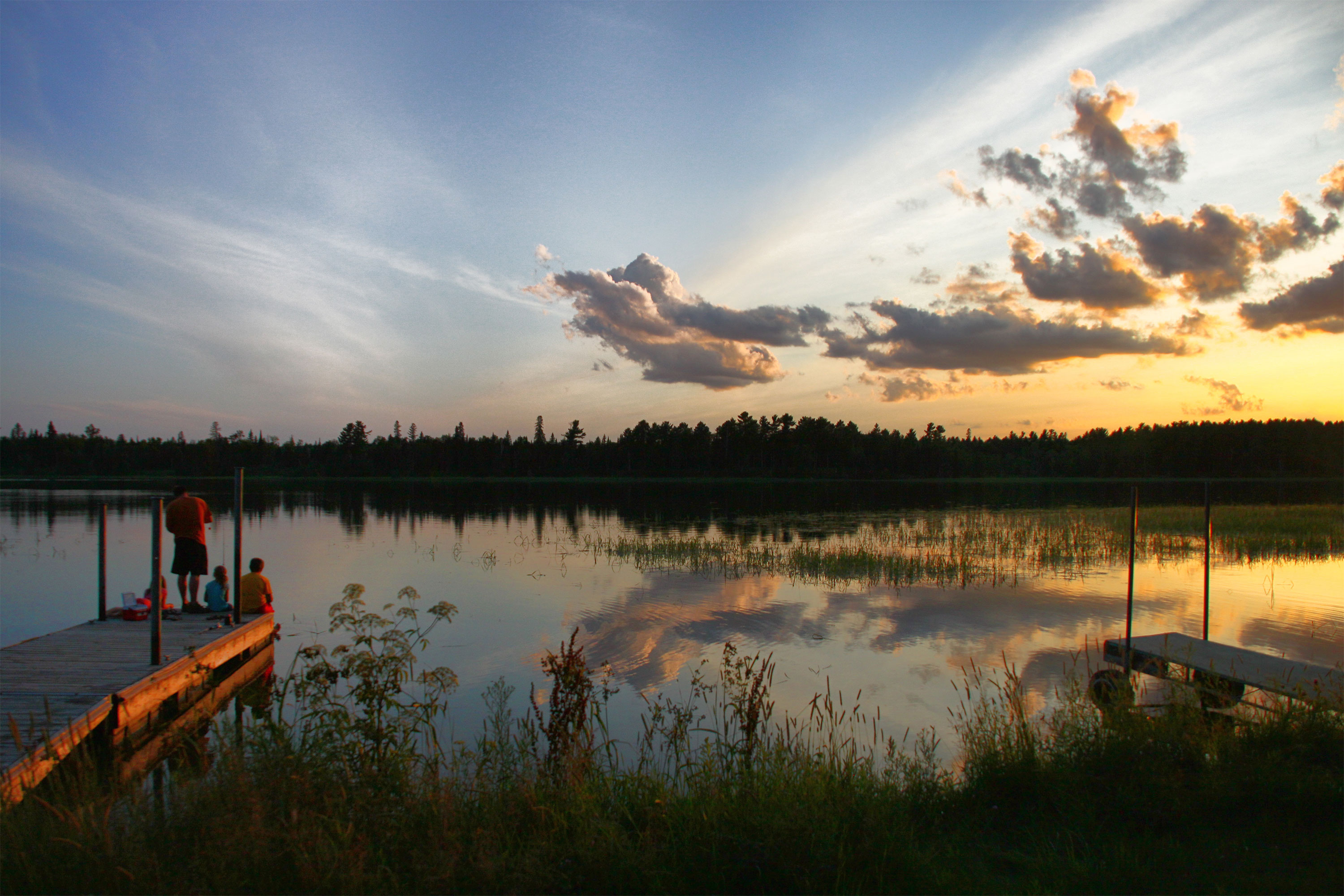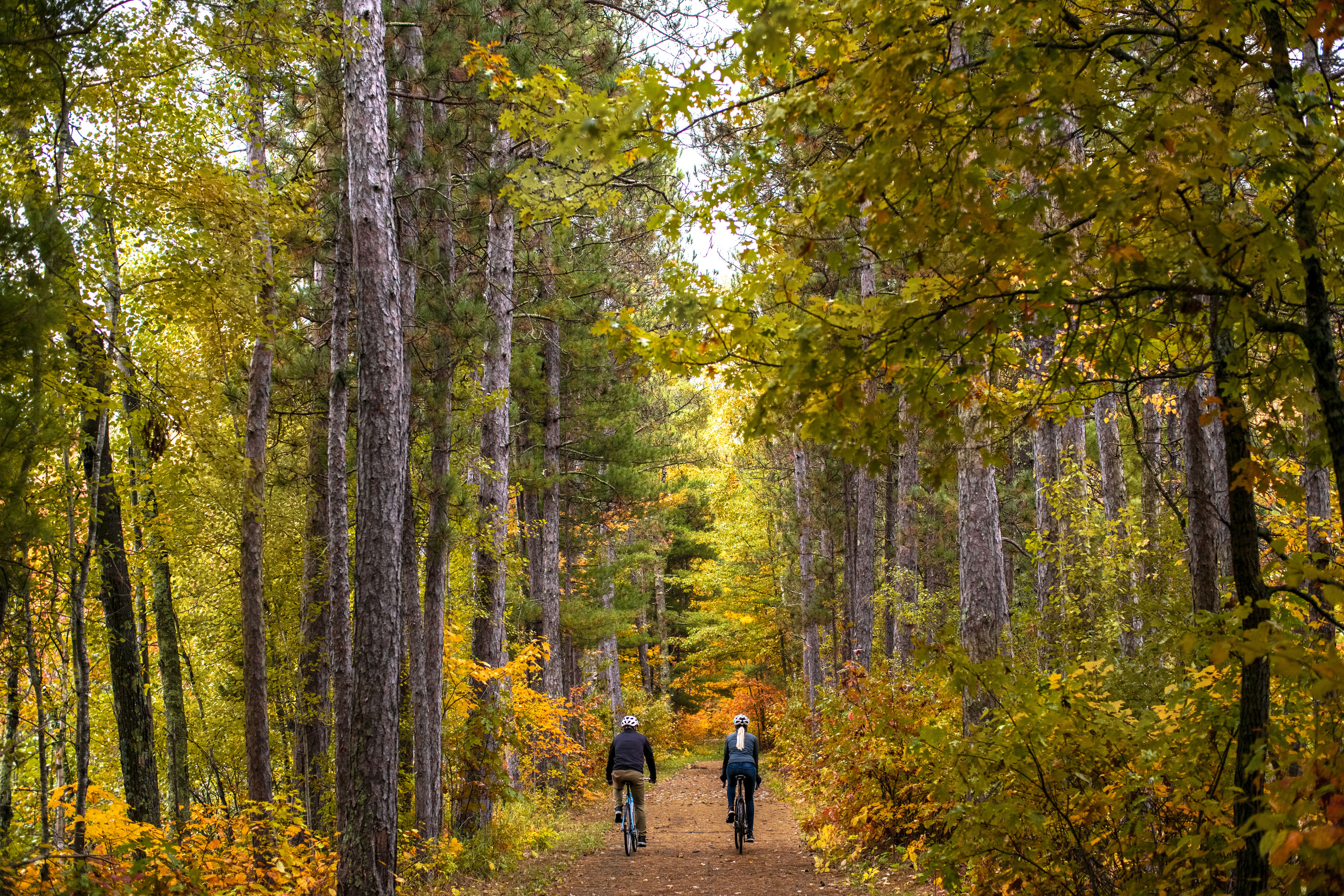Catch a Fish—and Plenty of Memories—in Northwest Minnesota
By Lisa Meyers McClintick

Family fishing at Itasca State Park / Christy Bruggenthies
A whoop, followed by laughter and excited chatter, comes up from a dock along the Crow Wing Chain of Lakes in northwest Minnesota. A few minutes later, our kids scramble through pines with big grins, trailed by my husband with his unexpected and sizeable catch still wriggling, its scales catching the sunlight.
“I had a little perch on the line,” he explains, “then this 5-pound northern leaped for the perch, and I caught it!”
This is a big-fish tale that’s true, and one of those surprising vacation experiences that sticks in your memory long after the smell of campfire washes out of your clothes. It’s also not a particularly uncommon story, as anyone who’s spent a weekend in northwest Minnesota can attest. The region is dotted with state parks and a national forest, legendary rivers and lakes, charming small towns, and family-run resorts replete with potlucks and communal campfires.

Walk across the Mississippi River in Itasca State Park
Where the Mississippi River Begins
The area’s biggest attraction, Itasca State Park, draws close to half a million visitors a year from across the globe. They make the pilgrimage to Minnesota’s first state park, established in 1891 to protect the headwaters of the famed Mississippi River.
Kids and adults playfully pose for photos and hop from rock to rock where the Mississippi begins as a small river flowing from Lake Itasca. From here, it wiggles and winds through northwest and central Minnesota before widening on its way south to the Twin Cities, where barge traffic begins and the current continues on its 2,500-mile journey to the Gulf of Mexico.
Back at Lake Itasca, guides narrate boat tours, pointing out bald eagles and loons, which are even more fun to watch from a rented kayak. Loons disappear in a blink when diving for fish and call out a northern welcome or after-dark serenade. Park visitors can also rent bikes and spend a day pedaling to scenic spots such as Preacher’s Grove, or meander along the scenic drive. A fire tower rewards its climbers with views above the trees in the 35,000-acre park.

Pedal on remote dirt roads and trails in the Chippewa National Forest / Micah Kvidt
Itasca offers year-round lodging, historic seasonal cabins and campsites that can fill up in the summer. Another good option for campers: more than a dozen state forests and the Chippewa National Forest. Established in 1908 as the first national forest east of the Mississippi, Chippewa’s 1.6 million acres now contain 21 campgrounds, 100 backcountry sites and 160 miles of hiking trails.
We’ve watched golden sunsets shimmer from sites at Norway Beach along Cass Lake—the state’s eighth-largest lake, known for its rarity of a second lake on its Star Island. At Stony Point, the horizon of the state’s third-largest lake, Leech, disappears like an ocean. On the smaller Lake Belle Taine in Nevis, campers drive across a narrow causeway to Camper’s Paradise, a popular island that has hosted families through several generations.

Grandparents and granddaughter eating ice cream outside their cabin / Aury G Photography, courtesy Dickerson's Lake Florida Resort
Retreat to a Resort
Travelers looking for more amenities should stay at resorts near small towns, offering easy access to groceries, as well as family-friendly diversions such as ice cream at Minnesoda Fountain, beach toys from an old-fashioned Ben Franklin and sweets from Aunt Belle’s Confectionary in charming downtown Park Rapids. The Heartland State Trail, a 49-mile paved bike trail, links Park Rapids to more shopping and eateries in Dorset, Nevis, Walker and Cass Lake.
With thousands of lakes to explore, most visitors will want to get on the water. Boats are often available for resort guests to rent, or from marinas and boat dealers. For an all-inclusive excursion, book a day with one of the region’s many fishing guide services. Fishing guides provide the boat, equipment and expertise to make your time on the water fun and bountiful, whether you’re a new angler, seeking a specific catch such as walleye or musky, or simply want to know the best spots to fish a daunting lake like Leech.

Chase on the Lake marina / Lisa Meyers McClintick
At Walker’s bustling marina, visitors can watch anglers come and go and see the sailboats glide by. The historic Chase on the Lake resort has a restaurant with a patio overlooking the marina, along with an on-site spa and modern guest rooms for travelers who prefer pampering to camping in the pines.
Most towns also offer public docks and piers that are perfect for kids and adults who are content reeling in panfish while enjoying the serenity of a lake and the plunk of a bobber. And if you’re lucky—like we were—you’ll still come home with a big-fish tale to tell.
